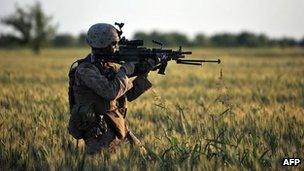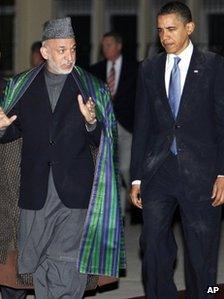Afghanistan, the election and the end game
- Published
- comments

Most US troops are due to leave Afghanistan by 2014
Congressman Walter Jones, external is that rare thing, a politician suffering remorse.
He's very public about his regrets over America's recent wars. In his office on Capitol Hill, where every wall is covered with surrounded by military memorabilia from veterans' organisations, he tells me he was duped by Bush and Blair.
A Republican, like his friend Ron Paul, he wants an end to the wars.
He's the man who pushed for the Congress restaurant to rename its French fries "freedom fries". He's rather shame-faced about this as well.
But it is the suffering of the bereaved and wounded that haunts him. He has signed 10,000 letters of condolence. He tells me he recently went to see a marine who had lost a leg. The marine had a question.
"Can you tell me something, Congressman?"
"Anything."
"Why are we still in Afghanistan, external?"
'We've won the war'
Congressman Jones says he has no answer to that, because he is campaigning for all the troops to come out now.
"After the death of Bin Laden the president should have announced that we've won the war, the war is over and we are going to start bringing our troops home."
He's contemptuous of the argument that they need to stay to train Afghans.

President Obama says Afghans now need to take charge of their own affairs
"They've had 10 years. They say they're trying to train the Afghans to be soldiers and police. Give me 10 years and I could train a monkey to ride a tricycle."
If the president did turn around and announce a total pullout it would delight not only Congressman Jones, not only Democrats but, according to polls, external, the majority of voters. But he's not going to do it.
The Republicans would attack him for cutting and running. The military would agree. And so would most foreign policy experts.
Ahmed Rashid, possibly the most perceptive observer of the conflict, has a new book, external out.
It makes depressing reading and laments Mr Obama's lack of grip on the war. He told me it was a mistake to set a deadline for a pullout.
"Certainly it was a very big mistake when he announced it when the surge first happened back in 2008/9, and he has to live with this albatross around his neck.
"But now there is talk of bringing the date forward and the troops could be out by next year," the Pakistani journalist said.
"I think that could be a huge mistake. One problem with President Obama has been that his policies have generally been supported, but none of them have been followed through with consistency. We don't want to be fumbling around with new dates.
"So far the administration has been sticking to 2014. If you pull out earlier you are really signalling that the Americans are collapsing and can't maintain their troops any longer - that would be a very negative signal to send. "
'Air of gloom'
After some debate with allies like Britain, the White House does seem firm. President Obama's deputy security advisor Ben Rhodes says the Nato meeting in Chicago in May will be the next milestone.
I asked him the same question the mutilated marine asked Congressman Jones: why was America still at war?
"The United States is meeting its core objective which is to defeat al-Qaeda and deny it a safe haven. Secondly we have a plan in place to wind down the war responsibly," he said. "So we are working on a plan that does bring the war to a close."
"That involves 33,000 US troops coming out by the end of the summer and a full transition to the Afghans by 2014."
"What we don't want to happen is the international community leaves and the Afghan government is not able to secure itself - then you have a situation where al-Qaeda can re-establish itself and the Taliban is over-running the country."
But isn't the president only sticking to this because he's trapped by internal American politics?
"The president has had criticism from some Republican candidates who don't want a timeline to bring the war to a close," Mr Rhodes replied.
"He made a clear statement last June when he moved faster than some of his generals wanted him to do, so I think the president was comfortable saying 'we do need to bring this war to a close, we need to do so as fast as we responsibly can but we have a commitment to the Afghans and to the alliance'."
Although some recent assessments, external say the war is going better than you might think, there is a general air of gloom about the eventual outcome.
Indeed, it struck me forcefully that the recent Taliban decision to suspend talks was greeted with real dismay.
Think about it. Ten years ago the Americans went into Afghanistan to topple the Taliban. Now, they seem desperate for a solution that includes the enemy they are still fighting.
End game
Ahmed Rashid is insistent that this is the only sensible way forward.
"Obviously things are deteriorating very fast in Afghanistan. It's not entirely his [Obama's] fault, but where he should be pulling out all the stops is in these negations with the Taliban," he said.
"These negotiations have been going terribly slowly, the president seems to be hedging his bets here in case he gets too much Republican criticism that he is soft on terrorism.
"The danger is these negotiations are becoming hostage to the American electoral calendar. Now that would be a disaster for the Americans, because what we need is an end to the civil war."
I ask Ben Rhodes about the talks: are they important for the end game?
"Absolutely. We believe if you look at the history of insurgency there is a military component in bringing them to an end but there is always a political solution as well.
"Ultimately Afghans are the ones who have to reconcile with one another and determine how they are going to live in their country together," he said.
"What this process can do is give a path to those Afghans who want to give up violence and don't want to be associated with al-Qaeda. They can come into the government and come into society again and give up the fighting that has gone on for so many years.
"The President has made it clear he is supportive of a political resolution but ultimately the Afghan Government is the lead.
Whether Barack Obama wins or loses the election in November, the end of America's longest war will be part of his legacy.
Long after 2014 the impact of the war will still reverberate in Afghanistan and throughout the region. It is hard to see a happy ending.